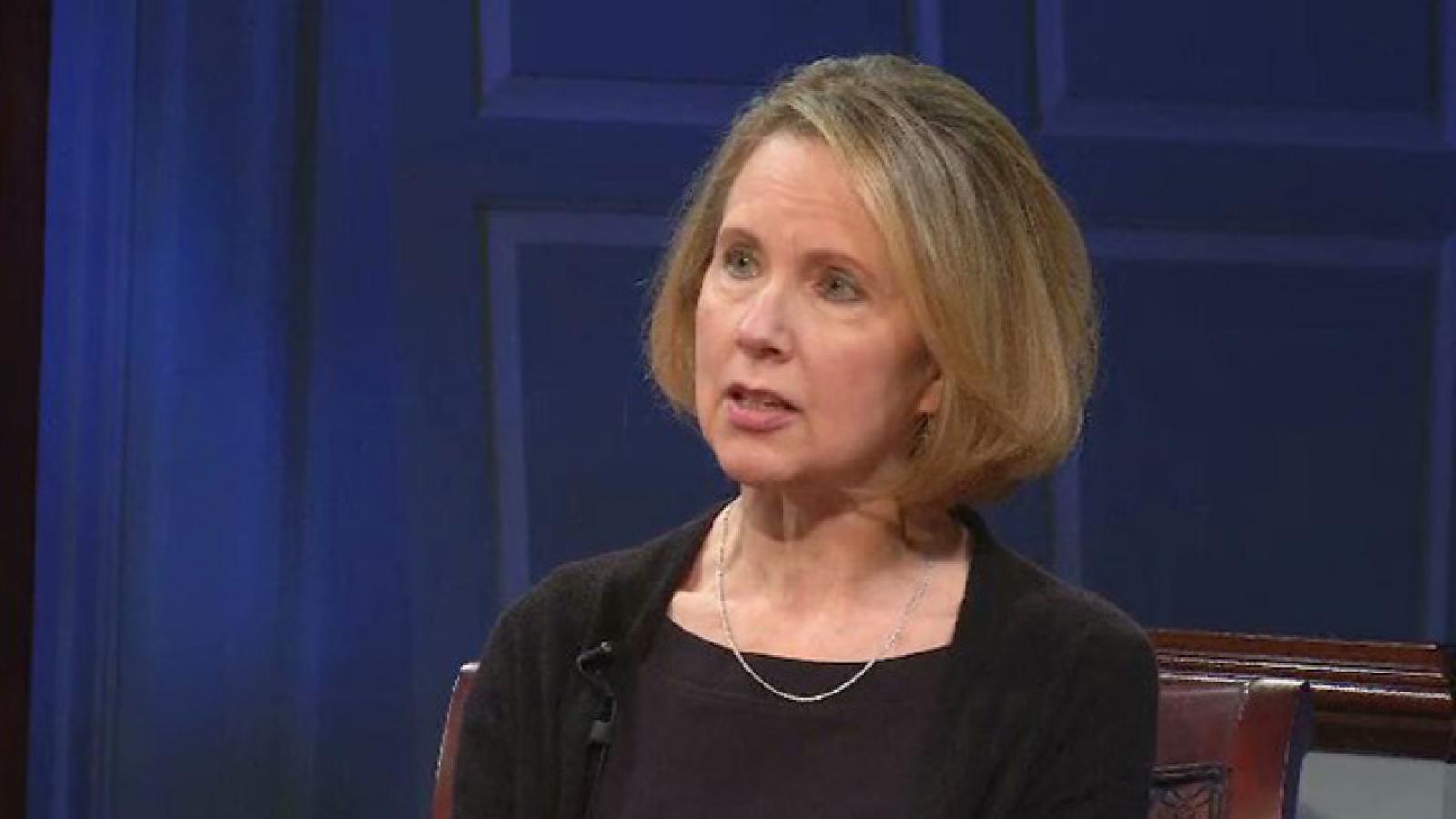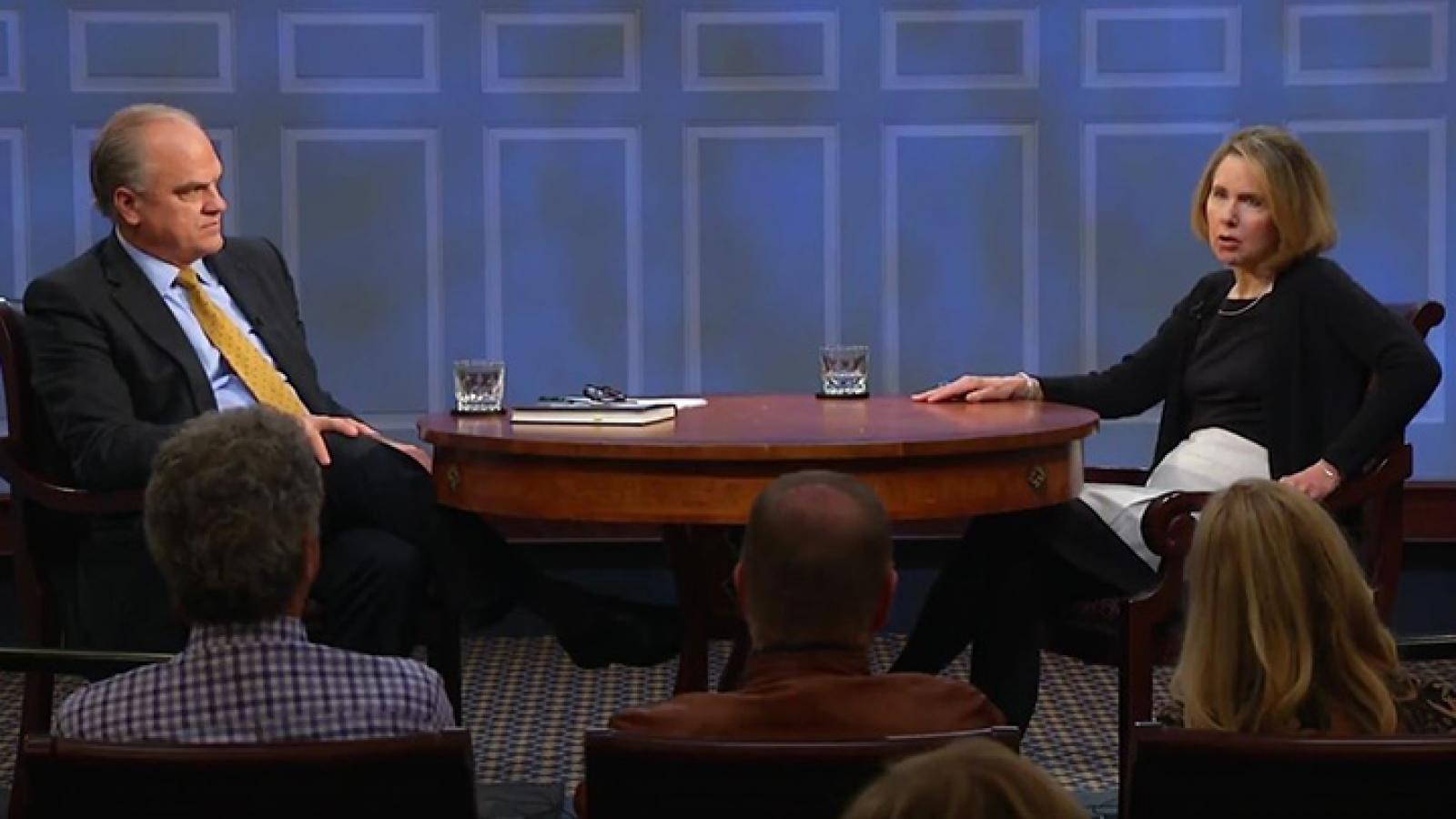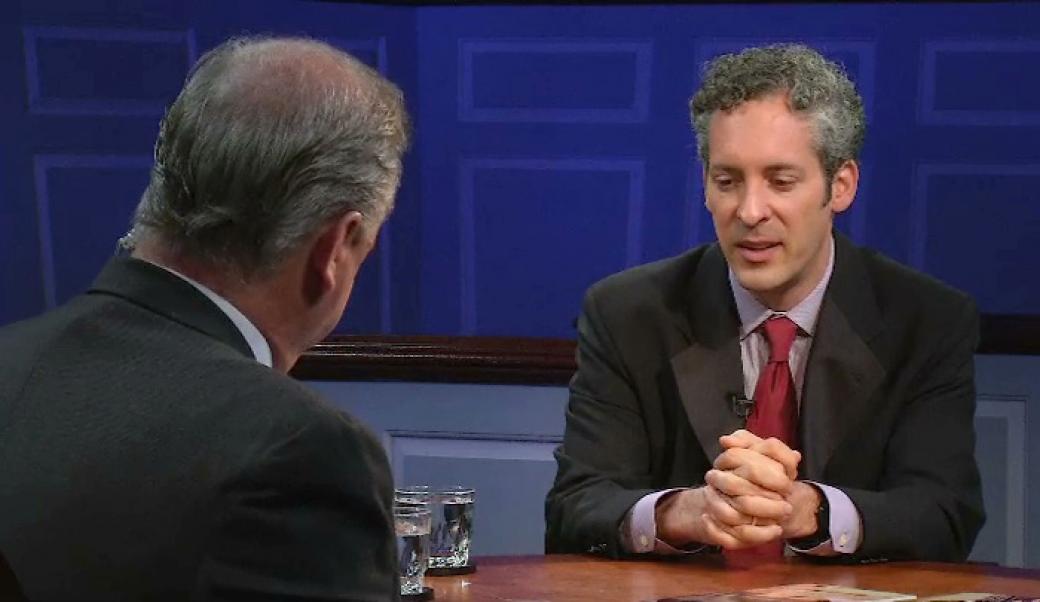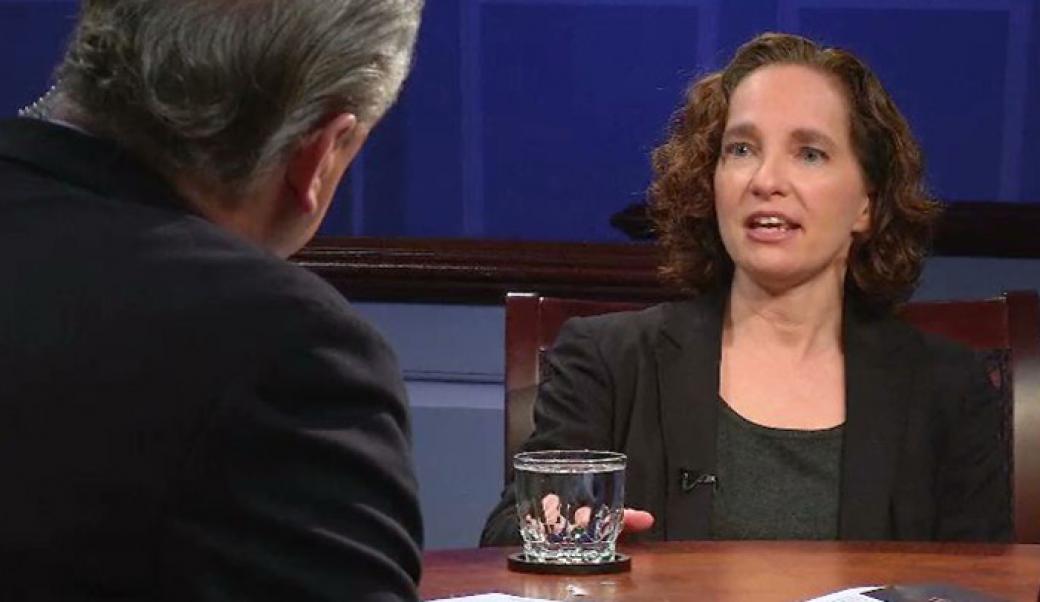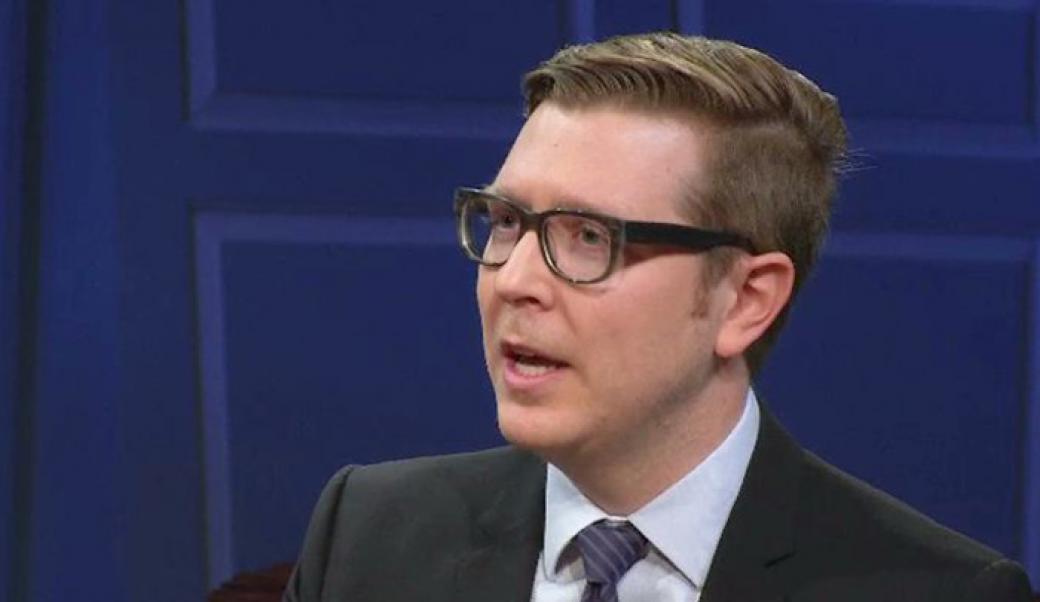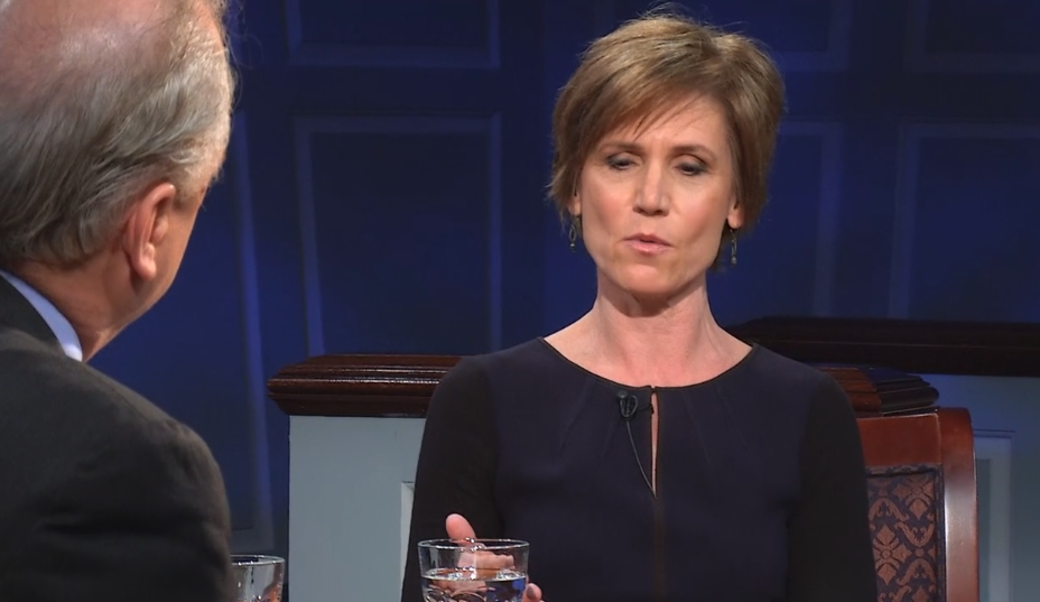About this episode
December 02, 2016
Heather Mac Donald
After riots erupted in Ferguson, Missouri, in August 2014, followed by several videotaped incidents of police killing African American citizens, the nation has been embroiled in an extended debate over police practices and racism. Our guest in this episode is Heather Mac Donald, a fellow at the Manhattan Institute, and most recently the author of the book "The War on Cops." She argues that the primary causes of police violence are the high rates of criminal behavior and violence by African Americans.
Law and Justice
Is there a war on cops?
Transcript
0:51 Douglas Blackmon: Welcome back to American Forum. After riots erupted in Ferguson, Missouri, in August 2014, followed by a rash of videotaped incidents of police killing African American citizens, we have all been embroiled in an extended debate over police practices and racism.
FACTOID: President Obama created task force to investigate police
President Barack Obama established a national commission to make recommendations to improve policing across the U.S. The two presidential nominees in 2016 clashed repeatedly over the issue: Hillary Clinton saying police and all Americans are vulnerable to a kind of unconscious racial bias; Donald Trump scoffed at that idea and said Clinton and her supporters were calling all police racists, and encouraging unfounded animosity toward law enforcement. A slew of scholarly, statistical, and historical analyses have been published, making the case that the criminal justice system disproportionately targets and punishes African Americans and Latinos.
FACTOID: The Question: Are police out of control? Or is there a war on cops?
In this episode we return to our ongoing special series: What Now? New Dialogues on Race in America, in which we are seeking out voices from across the political spectrum with varying views on how the nation should grapple with these grave issues. Our guest today is perhaps the clearest voice arguing 180 degrees in the opposite direction of the assumption that police are the primary problem. Heather Mac Donald is a fellow at the Manhattan Institute, a lawyer, contributing editor to City Journal, and has written multiple books and articles on policing, immigration, terrorism and other issues. She is most recently the author of a new book arguing that the primary causes of police violence are the high rates of criminal behavior and violence by African Americans. The book is The War On Cops: How the New Attack On Law and Order Makes Everyone Less Safe. Thank you for being here, Heather.
Heather Mac Donald: Thank you Doug; this is such a privilege.
2:47 Blackmon: You talk a lot about the “Ferguson effect.” Tell us exactly what you mean by that.
FACTOID: Unarmed black teen killed by white officer in Ferguson, MO in 12014
Mac Donald: Well, the Ferguson effect is the twin phenomenon of officers backing off of proactive policing and the resulting increase in crime. Last year we had the largest one-year increase in homicide in nearly a half century. The vast majority of the victims of that homicide increase have been black. The reason for this crime increase, I believe, is that officers are living today under a false and dangerous narrative that says they are shot through with systemic racism that we’re living through an epidemic of racially biased police shootings. And that the type of proactive policing that I think is responsible for a 20-year crime decline that this nation has enjoyed ah is under attack as racially oppressive. And by proactive policing, what I mean, Doug, is the vast universe of discretionary activities that officers can, but do not have to engage in, based on their knowledge of criminal behavior and observation on the street, above all pedestrian stops, what’s known as stop, question, and frisk and low level public order enforcement otherwise known as broken windows policing. Cops are doing much less of that in inner city areas.
4:23 Blackmon: By the way, one thing I want to set up at the very beginning of this is that you know, I’ve written a lot about both the history of law enforcement and race and then some of these contemporary issues of the last few years. A good bit of that beginning well before the last couple of years of turmoil. And one of the things I have consistently said to audiences and to individuals at this table, sometimes to the consternation of those audiences, was to observe that back in the 1990s when crime rate was still moving up and there was great extensile threat particularly in inner city areas, that Americans of all types black, white, and otherwise were strongly in favor of ramped up enforcement measures by police. We heard the story at this table once from Attorney General Holder talking about being out in the housing projects in Washington D.C. talking about diversion programs for youth offenders and such.
FACTOID: Eric H. Holder was U.S. attorney general from 2009 to 2015
And one of the African American tenant leaders there saying that all sounds good but before you leave tonight take all those young men who are out on my stoop, arrest [Mac Donald: Absolutely.] them and get them out of here tonight. And so it’s a somewhat uncomfortable thing for some folks but there has been wide spread support when the crime rate was at its peak, in particular for some of the sorts of things that were criticized now. So, but you take that argument a bit further. You, I think you go get further down the same road. But I do want to test some of the observations that you make. So for instance, the notion that stop and frisk or community policing that is responsible for the decline in crime rates. My sense has been that there it is more complicated understanding than that. That it’s hard to say for sure what actually brought crime rates down. Was it the aging of the population, particularly poor people, was it policing, was it changes in the economy or was it something else? There’s even a pretty strong theory that it has to do with led paint. That finally getting led out of the environment changed the violent tendencies. But so, how, but you’re very precise and very certain that it was those kinds of measures. How do you establish that? How do you back that up?
Mac Donald: Well because I don’t think the other factors line up with the timeline that we’ve got. There, in fact, was not massive changes in demographics. Ah, the led paint explanation doesn’t hold up because a drop in crime is a tertiary effect at best of led over exposure. The primary effects are impulsivity, ah, you know, lack of socialization. We would have expected to see great declines in those primary effects of lead poisoning ah, if the removal of led was in fact what’s responsible for in addition to the crime decline. And that we’ve not seen in inner city youth. So as far as I’m concerned the only thing that changed and changed radically starting in the mid-1990s was our understanding and practice of policing. This was a revolution that began in New York City under then Mayor Rudolph Giuliani and Police Commissioner William Bratton, that said it proposed something unheard of. It said police are actually going to lower crime and not just react to it. Police departments everywhere started poring over data, holding their commanders accountable, and asking cops to intervene. That is what changed policing in addition to ah, more curtained sentencing for repeat offenders that kept people off the streets for longer periods of time.
8:10 Blackmon: So it’s a combination of both policing practices and then also the other issue you talk some about in the book mass incarceration or just ah, ah, mandatory sentencing but more harsh sentencing in one respect or another. And so your contention is though that now as a result of these controversies over the past couple of years that police officers are not engaging in the level of intimate policing and discretionary policing that was so effective before. But what do we really know about particularly over a sustained period of time. I mean is there strong evidence that correlates the spike, this immediate spike in homicides in Chicago for instance that, do we know how that correlates specifically to a change in police practices?
Mac Donald: There was a study done in 2005, an economist at the University of Washington looking at the police riots in Cincinnati in 2001 and the economist found a clear correlation between officers backing off of that proactive discretionary type of policing and a rise in felony crime. Chicago is, as you suggest Doug, the primary example of what I called the Ferguson effect. Last year as crime was starting this very, very worrisome increase U.S. Attorney General Loretta Lynch called an emergency meeting in Washington in October of big city mayors, police chiefs, and U.S. attorneys from across the country to discuss this crime increase. Rahm Emanuel, the mayor of Chicago came and he told the participants that Chicago cops, as he said, had gone fetal. And they were less likely to interdict criminal behavior.
FACTOID: Murder rates in Chicago, Baltimore spiked sharply in 2015, 2016
That was 2015 when cops were already in Chicago reacting to this false narrative. This year, on top of last year’s back off of depolicing, pedestrian stops in Chicago are down 82 percent. Homicides and nonfatal shootings are up nearly 50 percent. Again you cannot talk to an officer. I was in Chicago in June an officer said he has never experienced so much hatred on the streets in his 19 years on the job. He said it’s basically an undoable job now.
10:30 Blackmon: There is a special ah set of expectations of police officers. I mean they have a special position in American society. They have powers that the rest of us don’t and the expectation that they’ll manage situations differently than others of us. And so it strikes me that it’s not completely unreasonable to think that, that the approach to a police officer’s behavior is at a much higher standard than simply other acts of violence that may occur among citizens. Is there any dimension of police behavior that’s problematic?
Mac Donald: Well Doug, you’re absolutely right in the points you make. A) There’s a very ugly history in this country of policing and race. The police worthy bulwark of our unthinkable betrayal of our nation’s founding ideals. They were essential to maintaining slavery, Jim Crowe segregation and there has been a history of violence and brutality. And that history understandably takes a long time to get over and it makes police shootings of blacks particularly understandably fraud. And that is a reality that nothing can erase. There’s no question about that. And it’s also true as you say Doug, that we should have a higher expectation for police officers and the thought of having a loved one shot by a police officer is understandably outrageous. Ah, and there’s been some very bad police shootings over the last two years that we’ve focused on. Ah, the shooting of Walter Scott in Charleston. The shooting of Laquan McDonald in Chicago. Those were abysmal failures of police tactics. But I think that the emphasis that’s given to them is disproportionate to the problem. And I do think that the Black Lives Matter narrative which has been accepted by President Obama, and I would say amplified and certainly abled by the mainstream media that says that we’re living through this epidemic of racially biased police shootings of blacks is simply not true. Ah, a greater percentage of white and Hispanic victims die from police shootings than black homicide victims. Police officers are eighteen and a half times more likely to be shot by a black male than an unarmed black male than is to be shot by a police officer. So again, while officers need more training, and officers are desperate for more tactical training. I know officers in Chicago who pay for it out of their own pocket. They want help in making those agonizing split second decisions of shoot don’t shoot. Unfortunately, what is now being promoted by ah by our president and Hillary Clinton is something known as bias training for officers. This is, as far as I’m concerned, not to mince words, a fraud. Why? Because the evidence shows, four academic studies have come out this year alone, that show again that everything we think we know about police shootings and raised from black Lives Matter activists is a hundred and eighty degrees, as you say Doug, wrong. If there’s a bias in police shootings, it actually works in favor of blacks. Now this is almost impossible to assimilate because it runs so counter to the media narrative. But Lois James at Washington State University, Roland Fryer a black economist at Harvard University, Ted Miller an economist in Maryland and the Center for Policing Equity have all shown that whites are more likely to be shot than blacks. Clinton’s bias training is based on this idea that police officers are walking around with implicit bias against blacks that is resulting in them shooting blacks out of racism.
15:01 Blackmon: But let me stop you here because those are very real studies and you cite them and others cite them and they are real things, real data. But implicit bias is about much more than that. There’s a great body of science that says implicit bias is a real thing not necessarily that, in those studies that you’re referring to aren’t about implicit bias, they’re about the assertion that there is a disproportionate rate of hom- of, of police officers shooting African Americans. Implicit bias is something that’s been studied in separate studies, in separate ways, and I think that it’s a pretty widely agreed on thing by many many social scientists that there is this thing. And the proof of that is that implicit bias is shared by most African Americans. And that’s the most remarkable thing about that, about these studies is that they find everybody when you go through these tests to try to select out our automatic subconscious reaction that African Americans and whites react almost to the same degree have make these presumptions of about a dark skinned person that they don’t make about a white skinned person. So I don’t think, I think it’s hard to, it’s risky to conflate these two things because the data about are there really more police shootings of African Americans now is very real and raise very real questions. It seems to me it doesn’t really, it may be a mistake to mix that into the question of whether in general ah police officers, both black and white, may have some tendency to assume things about African American civilians that they don’t assume about whites. I mean is that a reasonable distinction that I’m trying to make?
Mac Donald: Well no I don’t accept the distinction because the implicit bias training of officers is the police version of the concept of implicit bias, which is that police officers are trigger happy when it comes to confronting black suspects. And the data shows just the opposite. Officers are second guessing themselves when they’re confronting black suspects. Recently in Chicago there was a female police officer who was beaten to almost losing consciousness by a black suspect following a car stop for a stolen car. He had concrete that he was bashing her skull in with and she said I didn’t use my gun because I was so terrified about becoming the next viral video of an anti-black cop. And so it is very real. And I would say I think the implicit bias research literature is not worthwhile and is not credible because they have not shown that it affects behavior. That’s the key thing. These implicit association tests I’m not convinced that they’re not affected by the order, which we’re getting into the weeds here, but I, I just, I think that at least when it comes to police behavior the key point is unless you can show that officers are acting on this alleged implicit bias, please do not waste precious training dollars and time putting officers through this bogus—come on. Officers don’t need to hear that. What they need to do is go through realistic scenarios and, as I say, get better tactics. And I would also add, they need better attitudes. Officers can develop hardened, obnoxious attitudes in dealing with civilians. And they need constant training in courtesy and respect.
18:33 Blackmon: Let’s talk about stop and frisk for a moment. Let’s go back to that for a second. What is it about that…what is it that’s misleading about the data on the effectiveness of stop and frisk? Tell us how it is that it actually did the work and that data doesn’t mean what it might suggest in the minds of some.
Mac Donald: Well, the results sort of speak for themselves. We had the longest and deepest crime drop of any city in the country in New York City. We went from 2,245 homicides a year to over 300. Umm, we have criminals on tape overheard in jailhouse conversations or still down in the South saying they’re not carrying guns because of the risk of being stopped. Ah, we have the phenomenon of the community gun where crews or gangs, not, they don’t carry guns on their persons anymore, they’ll have a community gun whether it’s hidden under a mailbox or in a rainspout or their girlfriends are carrying it because they don’t want to be stopped with a gun. The data that is usually presented against stop, question, and frisk to make the prima facie case that it is racist goes like this. Ah, about 53 percent of all stops in New York City had black suspects. In New York City blacks make up 23 percent of the city’s population. So there’s a two to one ratio and what’s the explanation for that other than police racism? Well the explanation is the incidents of crime. According to victims of and witnesses to violent crime in New York City—and there are reports to the New York City police department—though blacks are 23 percent of the population, they commit 75 percent of all shootings and 70 percent of all robberies. If you add Hispanic shootings to black shootings in New York City, you account for 98 percent of all shootings in New York City. Whites are 34 percent of New York City’s population. They commit less than two percent of all shootings. This means for the police that virtually every time the cops are called out on a shots fired call, meaning there’s been a shooting, they’re being called to minority neighborhoods on behalf of minority victims and being given a suspect description, if anybody’s cooperating with the police, of a minority suspect. This is a reality forced upon them by the reality of crime. The cops have no say in this. Stop, question, and frisk aimed to intervene in criminal behavior, not just shootings but other types of crime whether it’s a drug set or somebody casing a victim in the neighborhood that’s had robberies of elderly people. If the cops saw somebody walking closely behind somebody, an elderly lady to stop and ask a few questions. Ah, and that is the historic power that the police have and when they stop making those stops, as officers will tell you, they lose control of the streets and that’s a, that, that phrase hits our ear poorly. It sounds too heavy handed. But in these communities the reality is that if the cops do not have control of the streets, the gangbangers will. And the elderly are terrified to go to the supermarkets to shop, parents have to worry about taking their kids to school, not because of the cops but because of gangs shooting at each other.
22:21 Blackmon: This special series of episodes that we’ve been doing that looks at the “what now” question of dialogues, it is very much an effort to try to find some solutions and new ideas for how it should be done. So it’s great to have someone here talking about an approach to all this that is different from the dominant media narrative. Umm so thank you for that. We’re also interested in identifying some ideas for the new president who will soon be in office. So let’s say it’s the day after the inauguration in January 2017 and you get a phone call from President Trump’s office saying I read your book or someone read your book and summarized it for me in pages, ah, and I’d really like to hear from you. How should I approach this? I need to bring some sort of order and calm around the turmoil around these questions. Come talk to me and tell me one thing or two things of the highest priority I should have about the war on cops. What would your advice to President Trump be?
Mac Donald: Change the narrative. That’s the most important thing. The president actually has not a huge effect on local law enforcement except if he’s putting out a false narrative. And as we see that has had a huge effect on police behavior with the result of black lives being taken. So I would say stop telling lies about law enforcement. Do not waste money on things like implicit bias training. I’m not in big favor of federal funding to localities period. Because it’s not as if it’s free money. It’s getting sucked up by local taxpayers, sucked up to Washington, sent back minus a whole lot of administrative costs. So I’m not even going to say to President Trump well if you want to help fund something, fund tactical training because again the federal money is just coming from the locals anyway so I would say start telling the truth about the extraordinary accomplishment of policing in saving lives and allowing many inner city neighborhoods to have economic development. Economic development is not the precondition to lowering crime. Lowering crime is the precondition to economic development. Ah, and give voice to those you know, bring them on the dais. When you give voice to those residents who actually need law enforcement, support them. Unless we have a change of rhetoric from the top they’re going to keep getting worse.
Blackmon: Heather Mac Donald. Thank you for being here.
Mac Donald: Thank you Doug.
Blackmon: The book is The War On Cops: How the New Attack On Law and Order Makes Everyone Less Safe. If you’d like to send us a comment about this episode or join an ongoing conversation about the presidency, police practices and race, go to the Miller Center Facebook page, or follow us on Twitter. My handle is @douglasblackmon. You can reach our guest at @HeatherMacDonald. To watch other episodes of American Forum, share them with your friends, join our email list, or read a transcript of this dialogue, visit us at millercenter.org/americanforum. I’m Doug Blackmon. See you next week.
